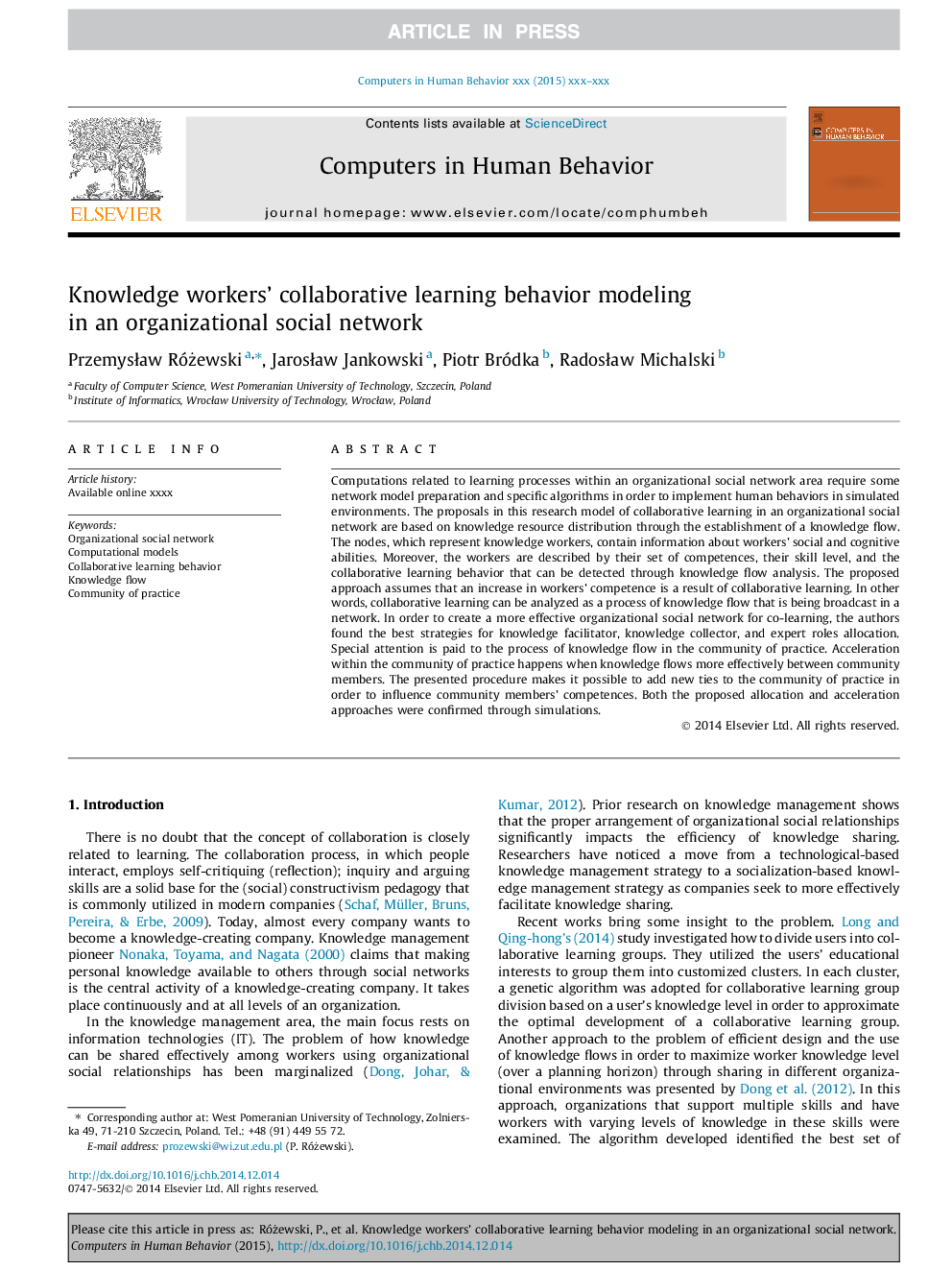| کد مقاله | کد نشریه | سال انتشار | مقاله انگلیسی | نسخه تمام متن |
|---|---|---|---|---|
| 10312671 | 618434 | 2015 | 13 صفحه PDF | دانلود رایگان |
عنوان انگلیسی مقاله ISI
Knowledge workers' collaborative learning behavior modeling in an organizational social network
ترجمه فارسی عنوان
مدل سازی رفتار یادگیری مشارکت دانش کارکنان دانش در یک شبکه اجتماعی سازمانی
دانلود مقاله + سفارش ترجمه
دانلود مقاله ISI انگلیسی
رایگان برای ایرانیان
کلمات کلیدی
شبکه اجتماعی سازمانی مدل های محاسباتی، رفتار یادگیری همکاری، جریان دانش، انجمن تمرین
ترجمه چکیده
محاسبات مربوط به فرایندهای یادگیری در یک شبکه اجتماعی سازمانی نیاز به تهیه مدل شبکه و الگوریتم های خاص برای اجرای رفتارهای انسانی در محیط های شبیه سازی شده دارد. پیشنهادات در این مدل تحقیقاتی یادگیری مشارکتی در یک شبکه اجتماعی سازمانی مبتنی بر توزیع منابع دانش از طریق ایجاد یک جریان دانش است. گره هایی که کارگران دانش را نشان می دهند، اطلاعاتی درباره توانایی های اجتماعی و شناختی کارگران دارند. علاوه بر این، کارکنان با مجموعه ای از شایستگی ها، سطح مهارت و رفتار یادگیری مشارکتی که می توانند با تجزیه و تحلیل جریان دانش شناسایی شوند، توصیف می شوند. رویکرد پیشنهادی بر این فرض است که افزایش صلاحیت کارکنان نتیجۀ یادگیری مشارکتی است. به عبارت دیگر، یادگیری مشارکتی می تواند به عنوان فرایند جریان دانش مورد بررسی قرار گیرد که در یک شبکه پخش می شود. به منظور ایجاد یک شبکه اجتماعی سازمانی موثر برای یادگیری همزمان، نویسندگان بهترین راهکارها برای تسهیل دانش، جمع آوری دانش و تخصیص نقش های متخصص را در بر داشت. توجه ویژه به روند جریان دانش در جامعه عمل است. شتاب در جامعه از عمل اتفاق می افتد زمانی که دانش جریان بیشتر از بین اعضای جامعه. روش ارائه شده امکان افزودن روابط جدید به جامعه از عمل را برای نفوذ در اعمال نفوذ اعضای جامعه فراهم می کند. هر دو روش تخصیص پیشنهاد شده و شتاب از طریق شبیه سازی ها تایید شده است.
موضوعات مرتبط
مهندسی و علوم پایه
مهندسی کامپیوتر
نرم افزارهای علوم کامپیوتر
چکیده انگلیسی
Computations related to learning processes within an organizational social network area require some network model preparation and specific algorithms in order to implement human behaviors in simulated environments. The proposals in this research model of collaborative learning in an organizational social network are based on knowledge resource distribution through the establishment of a knowledge flow. The nodes, which represent knowledge workers, contain information about workers' social and cognitive abilities. Moreover, the workers are described by their set of competences, their skill level, and the collaborative learning behavior that can be detected through knowledge flow analysis. The proposed approach assumes that an increase in workers' competence is a result of collaborative learning. In other words, collaborative learning can be analyzed as a process of knowledge flow that is being broadcast in a network. In order to create a more effective organizational social network for co-learning, the authors found the best strategies for knowledge facilitator, knowledge collector, and expert roles allocation. Special attention is paid to the process of knowledge flow in the community of practice. Acceleration within the community of practice happens when knowledge flows more effectively between community members. The presented procedure makes it possible to add new ties to the community of practice in order to influence community members' competences. Both the proposed allocation and acceleration approaches were confirmed through simulations.
ناشر
Database: Elsevier - ScienceDirect (ساینس دایرکت)
Journal: Computers in Human Behavior - Volume 51, Part B, October 2015, Pages 1248-1260
Journal: Computers in Human Behavior - Volume 51, Part B, October 2015, Pages 1248-1260
نویسندگان
PrzemysÅaw Różewski, JarosÅaw Jankowski, Piotr Bródka, RadosÅaw Michalski,
